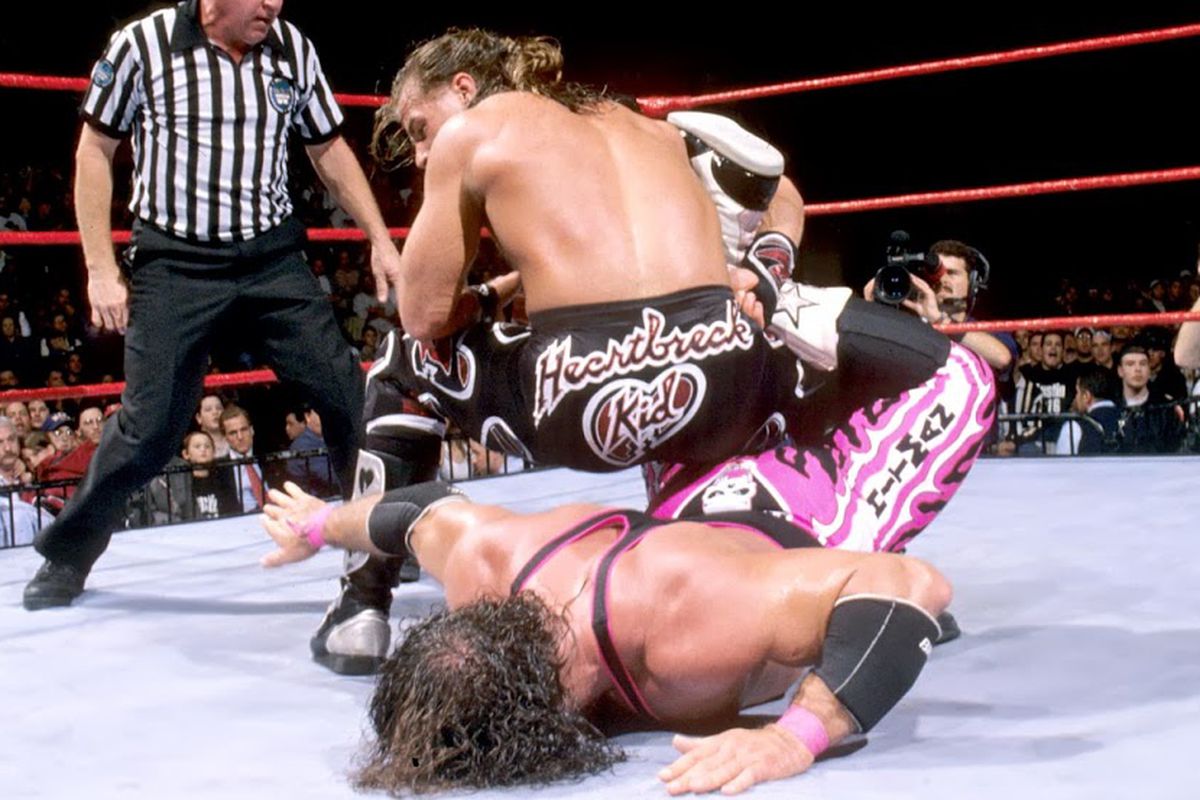Montreal Screwjob: The Controversy That Changed Wrestling Forever

On November 9, 1997, in the cold, impassive interior of Montreal’s Molson Centre—cold not because of any tangible temperature-related phenomenon but rather due to the almost Shakespearean betrayal that was about to unfold—an event transpired that would fundamentally alter professional wrestling’s ecosystem, the way a single mutation might ripple through a species’ evolutionary trajectory over generations. This was The Montreal Screwjob.
It was a moment so seismic that, even now, decades later, people still analyze it with the kind of forensic detail normally reserved for political assassinations and Apollo moon landing footage.
“I Regret That He Signed”
Vince McMahon, the impresario of sports entertainment, later admitted: “I regret that Bret ever signed with WCW.” There’s a particular sting in that statement, a lament not over what was done to Bret Hart but what Bret Hart had done to Vince McMahon. As though McMahon himself were the wronged party, as though the very act of Hart seeking financial security elsewhere was itself a kind of moral failing.
Bret Hart, five-time WWF Champion, heir to the Stu Hart Dungeon, a living totem of professional wrestling’s old-world craftsmanship, had agreed to leave the WWF for WCW’s deep pockets. There were numbers—millions of them, dollars upon dollars—but the specific figures are less important than what they represented: a defection, an exodus from the company where Hart had, by sheer force of skill and grit, elevated himself to the status of legend.
Hart, for his part, insisted he wanted to leave with dignity, even though dignity, in professional wrestling, is as slippery as an uncooperative wristlock. He had a simple ask: he wouldn’t lose the WWF Championship to Shawn Michaels in Montreal. Not there. Not in Canada. Not to him.
And therein lay the problem.
“Tell Me It’s Gonna Be Okay”
Shawn Michaels, who had, in the preceding months, become something akin to Hart’s personal antagonist both in storyline and reality, allegedly told Hart that he wouldn’t have returned the favor: “I appreciate you saying that, but just so you know, I wouldn’t do the same for you.” A moment of candor so blunt it could slice open a ring rope.
McMahon, meanwhile, faced what he saw as an existential crisis. He had already witnessed his former Women’s Champion, Alundra Blayze, defect to WCW and unceremoniously dump the WWF Women’s Championship in a trash can on live television. The prospect of Hart doing the same with the WWF Championship was untenable, a nightmare scenario for a man whose business revolved around maintaining the illusion that wrestling was a controlled environment.
And so, a plan was devised. A plan that would become one of the most infamous incidents in wrestling history.
“Ring the Damn Bell!”
The match between Hart and Michaels was a hard-fought, brutal affair—at least in the eyes of those unaware of what was coming. Then, in the waning moments, Michaels locked Hart into his own move, the Sharpshooter, a moment so rich with symbolism it could have been scripted by Sophocles.
Before Hart could reverse it, referee Earl Hebner—who, according to legend, swore on his children’s lives that he wouldn’t betray Hart—betrayed Hart. At McMahon’s order, Hebner called for the bell. The match was over. Hart had, according to the official ruling, submitted. He had not.
In the chaos that followed, Hart—realizing in real-time what had just happened—stood in the ring, eyes scanning for answers that would never come. Then, with the elegance of a man who has just discovered he’s been cheated out of not just a match but his entire professional identity, he spat directly in McMahon’s face. It was, perhaps, the most authentic moment in professional wrestling history.
Backstage, chaos. Hart, still pulsing with the rage of betrayal, allegedly punched McMahon, sending him crumpling to the floor. McMahon would later describe the event as a “business decision.” Hart would call it something else entirely.
“Mr. McMahon is Born”
The aftermath of The Screwjob wasn’t just a personal rupture between Hart and McMahon; it was an evolutionary shift in wrestling itself. McMahon, once a babyface commentator, leaned into his new role as the tyrannical Mr. McMahon, the ruthless overlord of the WWF who would become the perfect antagonist for Stone Cold Steve Austin and the Attitude Era’s wave of rebellious energy.
Michaels, too, would be haunted by the Screwjob, initially denying involvement before admitting his complicity years later. Hart, meanwhile, would flounder in WCW, lost in the shuffle of a company that never understood how to use him.
“A Business of Betrayal”
The Montreal Screwjob remains an eternal debate. Was McMahon justified? Did Hart bring it upon himself? Is wrestling a business where trust can even exist? These questions, like all good ones, have no definitive answers. Only opinions, only narratives shaped by the perspectives of those who lived them.
But one thing is certain: it was real. In a business built on illusion, The Montreal Screwjob was, for better or worse, as real as it gets.